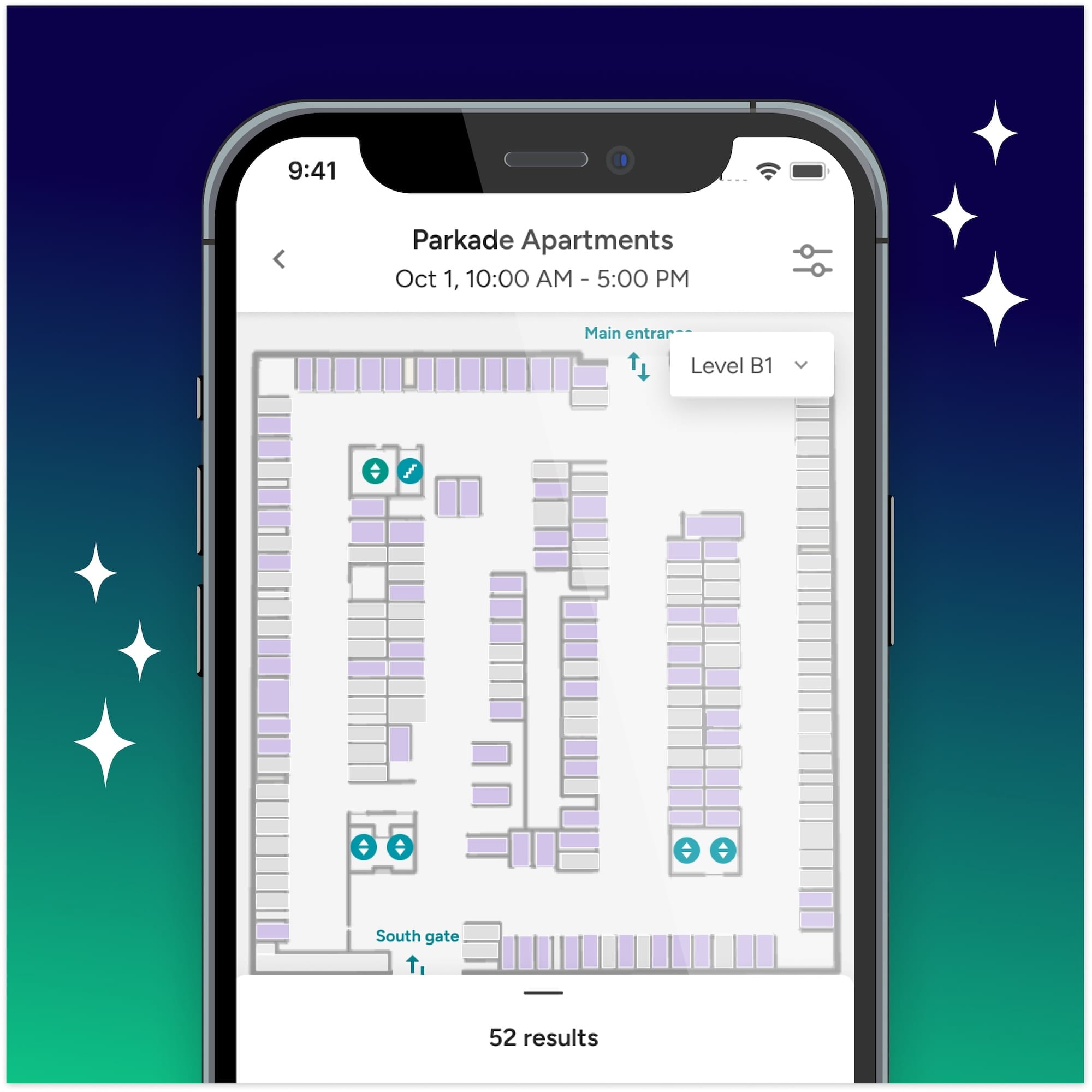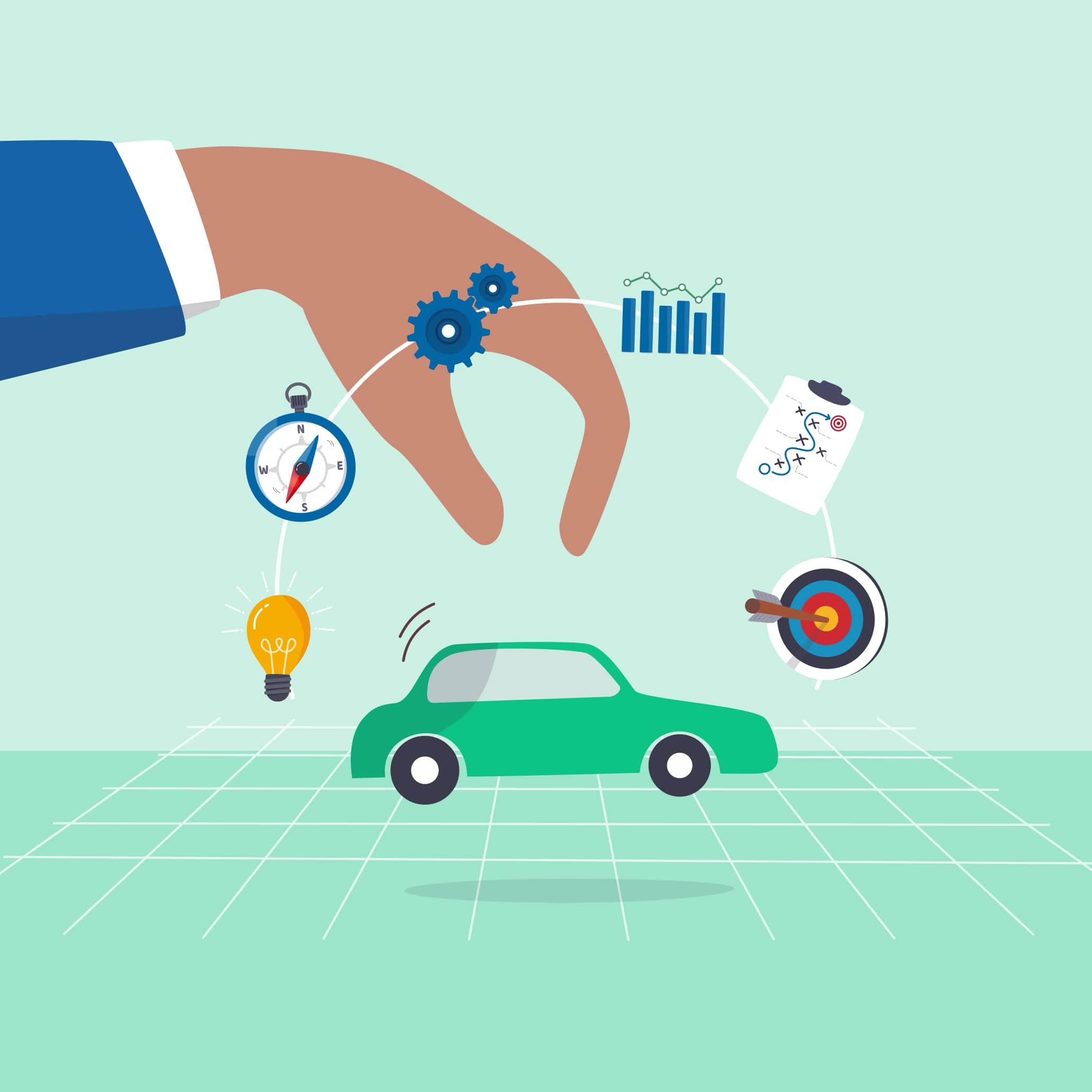

TABLE OF CONTENTS
For the past several decades, gate clickers have been the easiest way to give residents access to parking garages or lots. With a single press of a button, they can gain access to the building.
But now that technology has advanced, clickers aren’t the most efficient parking access option. So it’s time to look at your other options and only keep your clickers as a backup.
Despite how easy it is for residents to access your parking lot or garage with their clicker, they come with a variety of issues that are felt by both your property staff and your residents.
Since they’re relatively small, they’re extremely easy for residents to misplace. This can cause a massive headache for both residents and your staff as you scramble to get them access in the meantime.
One of our customer said of the time that they were using clickers for their parking access method: “Between residents misplacing or breaking these flimsy clickers, we were constantly scrambling replace them, and at times were stuck with no option but to wait when the ones we used were on back-order.”
You also have to consider cost here. While they aren’t typically very expensive – usually around $20-30 each – the costs can add up over time. Especially when you consider how many people may not return the clickers on move-out, you may end up shelling out a lot of money to replace them.
Since clickers are typically not made of very durable materials, you also have to consider the costs and inconvenience of replacing broken ones.
Perhaps the biggest pain point with gate clickers is that you have to physically give them to residents in order for them to gain parking access. This causes problems when future residents are touring or people are trying to get through your gate on move-in day.
Often, properties have trouble tracking down clickers from people moving out. This can lead to temporary shortages where your new residents may have to wait to receive a clicker.
Many clickers are simply a code scrambler disguised underneath a hard plastic outer shell.

That means that cloning a clicker is extremely simple. Anyone can purchase a generic version on Amazon, pop open the original clicker to see the code, and then program the new one with the same code.
This introduces the possibility of endless clickers floating around, in the hands of both residents and non-residents.
The downside of using gate clickers for parking access that is most noticeable for many properties is their inability to allow for easy guest access.
Since a physical device is required for entry, guests are left waiting for an alternative method of being let in, whether that’s a call box or the resident physically walking up to let them in. Using gate clickers almost requires that you need a secondary access method to ensure that guest access isn’t a major headache.
Luckily, there are plenty of options that you can go for now! So we decided to run through what these options are, and rank them from best to worst.
Ticket-based systems are common at places like public parking lots and shopping centers. As a vehicle enters the gate, they grab a ticket and then feed it into a machine when they leave, often paying a parking rate.
While these may be popular in commercial parking lots, they’re not typically the best choice for multifamily or office complexes. Many developers avoid these if they can because POS systems are very expensive, including the several thousand dollars needed for the initial install, as well as expensive maintenance costs.
In one particularly painful experience, a building we talked to had to delay opening by a few years, and once they finally opened, their ticketing system no longer worked and left them with the bill for a $25,000 software upgrade.
However, if you’re operating a combined residential/retail space with a shared parking lot, having a ticket-based POS system may be an option you need to consider.
Keypads are another classic method of access control where parkers can simply type in a code to gain access. This tends to be a popular system in private parking areas with a limited number of users.
One of the main benefits of this method is that it is very low-cost due to the simplicity of the technology. Many commercial keypads can be under $500.
However, also due to the simplicity of the systems, security breaches are likely. It’s very easy for the codes to circulate widely, giving many non-residents access at any moment. This is the reason this typically works better with smaller properties where there will be a smaller number of people with the code.
Some properties try to rotate out codes on a weekly, bi-weekly, or monthly basis to avoid any security issues, but this often takes up a lot of time for staff and can cause frustration for residents. One of our customers, Canal Square, used the weekly code cycling strategy before making the switch to Parkade, and they quickly became frustrated with planning out the codes in advance, sending out warnings to residents, and all of the other headaches that come with this tactic.
RFID windshield tags or tap cards are another common parking access method for multifamily buildings.
These are becoming more popular among building managers for a variety of reasons, including the fact that they’re quick to use, contactless (or in the case of tap cards, mostly contactless), and much cheaper than clickers.
There are two different versions of RFID readers that accompany these tags or cards. The long-range readers are typically the most attractive option, because they can detect the card in the car, automatically triggering the gate to open. These typically come with a larger price tag.
Short-range readers, on the other hand, require the driver to tap their card on the reader. While these are cheaper than the long-range readers, you sacrifice the fully contactless experience, and some readers can be a little sensitive and give residents access issues at times.
While these are considered a big step up from gate clickers, they introduce the same guest access problem. Since these require a physical card for entry, it leaves guests unable to gain entry.
One of our clients previously used RFID cards before making the switch to Parkade, and they were constantly dealing with complaints about guests not being able to enter as well as issues with delivery drivers gaining access.
Many developers and property managers are keeping an eye on this upcoming technology known as Automatic license plate recognition (ALPR). It’s a low-touch and “barrier-less” option that can automatically read the license plates as they’re entering.
Property managers love this option because of their ability to connect it to an up-to-date, digital record that ensures only cars that are allowed to enter will pass through. And residents love it because all they have to do is drive up and let the machine do the rest of the work.
As promising as this technology is, it has some limitations as it currently stands. The most common issue is how the elements – i.e. snow or mud – can obscure license plates and make it impossible for the system to read.
Controlling parking access via smartphone is an increasingly popular option for multifamily and commercial properties alike. Not only does it provide more efficiency for the staff tasked with managing parking, but it’s also delivering on the priorities that residents have; 59% of renters who responded to a recent survey said that mobile access control (including both for gates and their apartments) is an amenity that would make them more likely to sign a lease.
Entry and exit are controlled via a cellular data or wifi-enabled app. Residents can simply drive up and press a button on their phone to gain access, and guests can open the gate with just a few clicks in the app or webpage.
In addition to the seamless and contactless experience this provides for people as they park, many developers and property managers also love the ability of these smart parking apps to integrate with other systems, such as your property management system (PMS).
Not only do these integrations allow you to charge for parking without installing an expensive POS system, but it also ensures that all systems are aligned at all times. This moment-to-moment flexibility ensures that any updates in your process – i.e. the availability of new spots, changes in payments, etc. – are automatically reflected everywhere.
One of the great things about this parking access method is that it excels where other methods meet their downfall: guest access. Since no physical device is required and guests only need the app or access to a web-based version of the app, they are able to gain access seamlessly.
Even for the most complicated access situations – for example, one of our customers only opened up certain levels of their garage to guests – a smart app makes enforcing these restrictions no harder than toggling a few settings.
For most properties, the decision to switch to app-based parking access with a tool like Parkade is an easy one. In addition to giving your residents and their guests seamless, immediate access to your parking lot or garage, it also introduces the opportunity to optimize the amount of parking spots you have available and even boost your parking revenue.
Want to learn more about how Parkade can replace your current processes with an end-to-end parking management solution? Learn more about the core features and benefits.
.jpg)
As parking management becomes increasingly digital, security becomes critical — and we’re excited to share that we've achieved a major security milestone.
Read Story
We’re thrilled to announce one of our most significant leaps forward this year: the launch of dynamic maps across our mobile and web applications.
Read Story
Now that AB 1317 is official, it’s time to brush up on the requirements and see how your properties stand to benefit.
Read Story